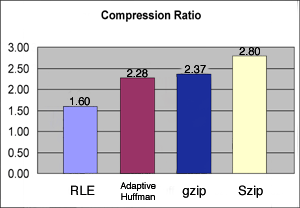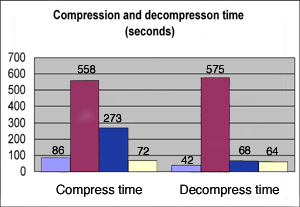Comparison of compression performance in tests with HDF4

Size of compressed output [1]

Speed of compression operation [1]
To obtain: SZIP Source Code
Szip compression software, providing lossless compression of scientific data, has been provided with HDF software products as of HDF5 Release 1.6.0 and HDF4 Release 2.0.
|
Comparison of compression performance in tests with HDF4 |
 Size of compressed output [1] |
 Speed of compression operation [1] |
As the graphs to the right illustrate, the primary gain with Szip compression is in speed of processing. Szip also provides some advantage in compression ratio over other compression methods shown here. These results, including the data presented in the graphs below, are from tests conducted by Pen-Shu Yeh, et al. [1], with the HDF4 Szip integration.
Applications use Szip by setting Szip as an optional filter when a dataset is created. If the Szip encoder is enabled with the HDF5 library, data is automatically compressed and decompressed with Szip during I/O. If only the decoder is present, the HDF5 library cannot create and write Szip-compressed datasets, but it automatically decompresses Szip-compressed data when data is read.
See this sample HDF5 program for an illustration of the use of Szip compression with HDF5.
Details of the required and optional parameters are provided in the
H5Pset_szip
entry in the HDF5 Reference Manual.
Software distribution: Starting with Release 1.6.0, HDF5 has been distributed with Szip enabled, making it easier to use Szip compression. The software is distributed as follows:
Applications use Szip by setting Szip as an optional filter when a dataset is created. Once enabled, data is automatically compressed and decompressed with Szip during I/O.
See this sample HDF4 program for an illustration of the use of Szip compression with HDF4.
Details of the required and optional parameters are provided in the
SDsetcompress, SDgetcompress,
SDsetchunk, SDgetchunkinfo,
and HCget_config_info
entries in the HDF4 Reference Manual.
Software distribution: HDF4 is distributed with Szip enabled, making it easier to use Szip compression:
Commercial licenses are available for commercial users who wish to distribute an Szip-based software product or engage in commercial uses that are not allowed above. For further licensing information or to view a copy of the Szip copyright statement, see Commercial use terms and the copyright and license notice pertaining to Szip in HDF products.
H5Pset_szip
entry in the HDF5 Reference Manual
for HDF5 Szip usage information
SDsetcompress, SDgetcompress,
SDsetchunk, SDgetchunkinfo,
and HCget_config_info
entries in the HDF4 Reference Manual
for HDF4 Szip usage information